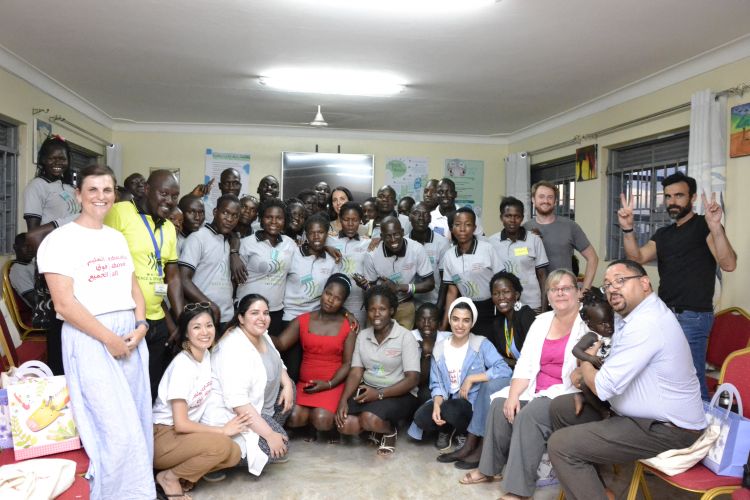
March 26, 2019 – On March 11 and 12 2019, Education Above All (EAA), through its Protecting Education in Insecurity and Conflict (PEIC) program, and the Whitaker Peace & Development Initiative (WPDI) held a two-day workshop to strengthen the advocacy skills of 35 young women and men participating in WPDI’s Youth Peacemakers Network (YPN). Framed by the principles of Global Citizenship Education (GCED), the training included presentations and participative sessions focusing on key values of global citizenship, United Nations Sustainable Development Goals (SDGs) and the Human Rights Framework, in particular, the right to education. It featured a segment led by the Office of the Special Representative of the Secretary-General (SRSG) for Children and Armed Conflict. WPDI and EAA also visited a secondary school where WPDI maintains a peace education program supported by EAA.
The main workshop was organized in the context of the partnership between EAA and WPDI, respectively led by SDG Advocates H.H. Sheikah Moza and Forest Whitaker, who are also respectively UNESCO Special Envoy for Basic and Higher Education and UNESCO Special Envoy for Peace and Reconciliation. Based on EAA and WPDI’s shared commitment to education as key to the achievement of peace, human rights and sustainable development, the workshop aimed at complementing the one-year training of the South Sudanese and Ugandan young women and men participating in the YPN, to become effective advocates, leaders, mediators and entrepreneurs in their communities.
The major focus of these peacemakers is to promote sustainability, peace and human rights among a variety of stakeholders, from local leaders to international fora. To support this mission, EAA presented resources to deepen understanding of essential concepts for peace, provided tools for advocacy and facilitated an interactive advocacy planning exercise that they can refer to in a variety of contexts.
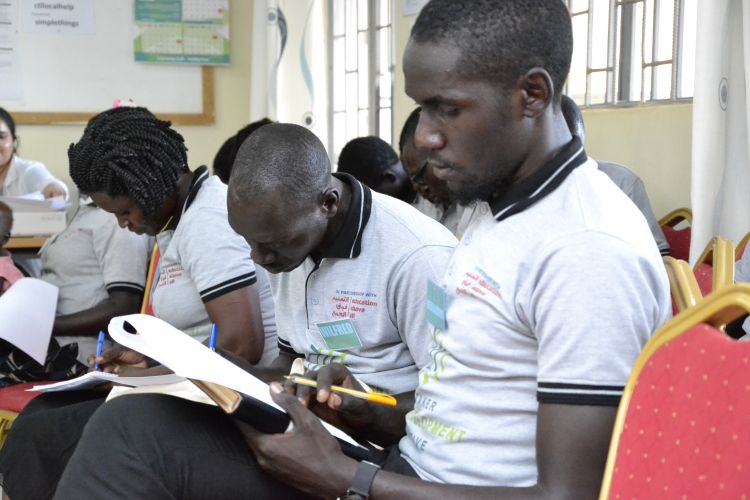
The workshop started with an introduction on the SDGs by WPDI. The objective of the session was to raise awareness of the trainees as global citizens required to think globally – using, for instance, the SDGs as a universal framework of reference – and act locally – for instance through the projects they are to develop in their communities when they become full-fledged peacemakers. The objective was also to help them use the SDGs as a basis for engaging with a variety of stakeholders and partners, including among national and international organizations.
EAA introduced key values of global citizenship as fundamental enablers for achieving the UN SDGs as well as sustainable peace. Informative sessions on essential values such as identity, globalization, peacebuilding, reconciliation, human rights and respect for diversity in ethnicity, language, culture, religion, gender, disability status, socio-economic status as well as opinions were followed by interactive activities to deepen understanding of each concept.
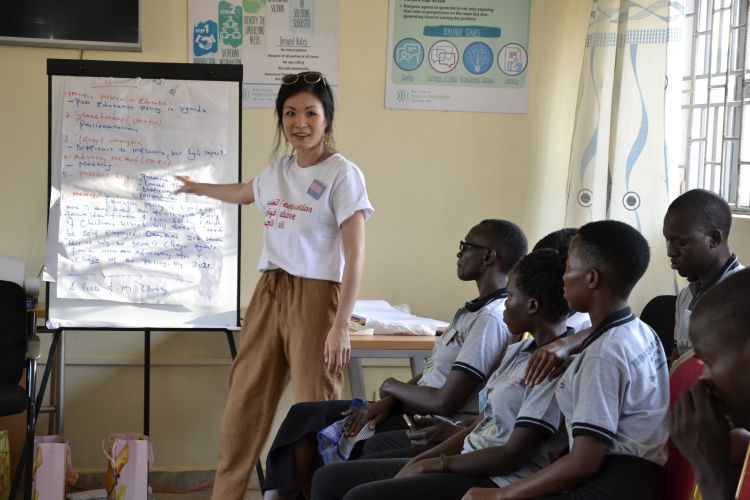
The next session introduced Trainers to the overall human rights system, specifically of where human rights exist in international, regional and national agendas. The initial focus was spent exposing the different fundamental rights enshrined in the Universal Declaration of Human Rights, serving as the starting point. Upon further exposure to other international documents, the regional document of the Banjul Charter and the inner workings of the AU was discussed, leading to light being shed on the state of Uganda in its ratification status and nationalizing fundamental rights in national agendas. With the system discussed and clarified, the focus was spent on the right to education and its relative importance to realizing other rights and to realizing the full potential of an individual. Discussions of the right to education as an enabling right led to participants harmonizing the human rights system and the SDG Agenda as one. The module ended with a key takeaway: human rights, development, and peacebuilding are interlinked and interdependent – one cannot exist without the other.
With a better understanding of the key ideas, EAA moved onto a session on building advocacy skills. The training was designed based on the ‘Youth Advocacy Toolkit: The Education We Want’ developed by the Youth Advocacy Group of UN Secretary General’s Global Education First Initiative (UN GEFI) supported by EAA from 2012-2016. A step-by-step walkthrough of advocacy designing process (Understand it, Plan it, Do it) provided tools to identify an issue, plan a strategy and implement advocacy.
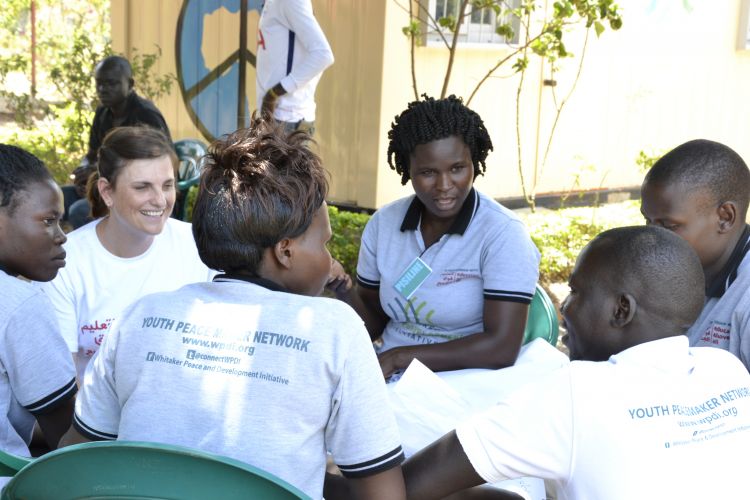
The training was followed by group activities to design advocacy on the local level for the selected SDGs that were important to them and their communities. Chosen SDGs were Goal 3 (Good Health and Wellbeing), Goal 4 (Quality Education), Goal 5 (Gender Equality), and Goal 6 (Clean Water and Sanitation). After identifying specific issue relevant to the goal, each group analyzed stakeholders, drafted key messages and best advocacy tools. Each group presented their advocacy plan using different forms of platforms such as theater, drama and fictitious parliament sessions. For each presentation by a group, the other groups would endorse the role of target stakeholders and react in kind to the messages of their peers, stressing successes and inviting to reflect on gaps. This helped strengthen their capacity for developing advocacy strategies and delivering messages on human rights, education, and peace with effectiveness.
The workshop included a session by Mr. Paddy Dowling, a humanitarian photojournalist. He shared his empowering stories of what has inspired him to use photography and journalism as a platform to advocate for the right of children and young people in conflict-affected areas. The session was helpful for participants to understand various platforms that could be used for advocacy.
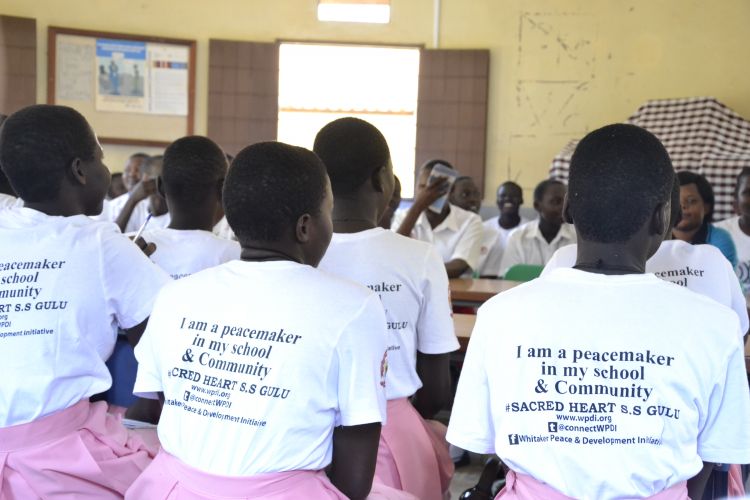
Another session was led by the Office of the SRSG for Children and Armed Conflict, a partner of WPDI and Mr. Whitaker who sits on the Steering Committee of the Global Coalition for Reintegration of Child Soldiers. The session consisted of an introduction to the mandate of the Office complemented by a basic presentation of such UN bodies as the Security Council, the General Assembly, and the Human Rights Council. The objective of the session was to collect information and recommendations from the participants, many of whom have been affected by conflict at some point in their lives, including through experiences of forced displacement, loss of closed ones, forced enrolment in armed groups, or simply living in a conflict country. The majority of their recommendations focused on access to education, including for children and youth with disabilities, trauma healing services, opportunities for sustainable jobs. Sustainable reintegration, they insisted, relied also on acceptance of former child soldiers by the community, which entailed fighting against stigma, for example. The main lesson from this session is that the youth participants felt empowered by being treated as experts and sources of authoritative information on matters they had firsthand knowledge of.
The workshop closed on a feedback session and the delivery of certificates. The participants were very enthusiastic about the workshop, which some of them described as transformative. They reported that advocacy tools would undoubtedly prove very useful when they undertake their projects and initiatives in local communities.
In addition to the capacity-building workshop, WPDI Founder/CEO led an official visit to the Sacred Heart Secondary School for girls of Gulu, where WPDI has a program on conflict resolution education, supported by EAA, who joined him along with the Office of the SRSG for Children and Armed Conflict. Holding a peace education program in Sacred Heart is all the more meaningful that, twenty years ago, the school had been targeted by armed groups who abducted dozens of students. Students participating in our peace club program told us of their experience with WPDI, many of who explaining how learning conflict resolution skills had transformed their lives and empowered them. Accordingly, the message that the headmaster had for us resonated deeply with our very mandate and our partnership with EAA: “The impact of this club will not stop to its participants it will trickle to the whole school and beyond.”